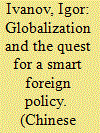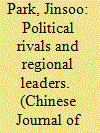|
|
|
Sort Order |
|
|
|
Items / Page
|
|
|
|
|
|
|
| Srl | Item |
| 1 |
ID:
120149


|
|
|
|
|
| Publication |
2013.
|
| Summary/Abstract |
This article employs the idea of the tributary system-most often associated with China's international relations from antiquity-to interpret how America relates to the rest of the world. I argue that the United States has instituted the most successful tributary system the world has ever seen. As the hub or epicenter of the most extensive network of formal and informal alliances ever built, the United States offers its allies and partners-or tributaries-military protection as well as economic access to its markets. In return for all its exertions, the tribute America seeks is straightforward: first, that it be recognized as the power or hegemon, and second, that others emulate its political forms and ideas. With both tributes in hand, the United States finds equanimity; it and the world are safe, at least from the United States' point of view.
|
|
|
|
|
|
|
|
|
|
|
|
|
|
|
|
| 2 |
ID:
120151


|
|
|
|
|
| Publication |
2013.
|
| Summary/Abstract |
Why and how can historical cases support different assessments of China rising with respect to the possibility of its becoming China threat? Rationalists and strategic culture analysts, who predominantly look at China from an external position, debate the influence of power, strategic cultures, and identities in explaining this highly controversial question. We, however, develop an internal view from the standpoint of a China looking out, which argues that different sources of Chinese self-role concepts could yield different policy behaviour. We analyse two discourses on Chinese foreign policy that have emerged in the 21st century-core national interest and harmonious world. We then introduce the dialectic approach of harmonious realism wherein indecisiveness is the essential characteristic. It is failure to decide on the specific purpose of Chinese foreign policy that creates China's self-role conflict. Harmonious disciplining, balance, racism, and intervention are the practical forms of China's harmonious realism through which the contemporary case analysis explains the forms, actual policy, and behavioural consequences of China's self-role conflict.
|
|
|
|
|
|
|
|
|
|
|
|
|
|
|
|
| 3 |
ID:
120150


|
|
|
|
|
| Publication |
2013.
|
| Summary/Abstract |
Globalization continues to be a growing trend from the economy, security, and even the individual as ideas are rapidly exchanged between different cultures. State-actors, although still a critical component, are competing for influence with the private sector, transnational movements, international media, and even small NGOs. In this globalized world nations must adopt the concept of 'smart' foreign policy. The basic idea of 'smart' foreign policy is outlined in nine major points: focusing on the long term rather than short term opportunistic gains; separating domestic from foreign policy agendas; credibility; global intellectual leadership; enhancing the bureaucratic decision-making process to include all actors in the new globalized world; working more closely with the academic community; harmonizing public and private instruments of foreign policymaking; better educating societies on the concept and benefits of globalization; and finally, enhancing communication among all nations. These nine components of 'smart' foreign policy will help facilitate a better world where new opportunities can be discovered and greater progress can be made without the alienation of one group or nation.
|
|
|
|
|
|
|
|
|
|
|
|
|
|
|
|
| 4 |
ID:
120152


|
|
|
|
|
| Publication |
2013.
|
| Summary/Abstract |
This article argues that the dual identities of political rivals and regional leaders have been of critical importance in determining China and Japan's regional policies and their bilateral relations within East Asian cooperation. China and Japan, in identifying each other as political rivals rather than cooperative partners, have defined their interests in regional cooperative projects, particularly those led by the other party, in terms of power politics. At the same time, China and Japan's efforts to gain followers' acceptance of their aspired leadership identities have shaped their regional policy options and behaviours. The combination effects of these dual identities have produced variances in China and Japan's regional policies and their bilateral relations within East Asian financial and institutional cooperation. Particularly with regards to regional projects led by the other party and supported by a majority of followers, China and Japan cooperated with the intention of neutralizing the other's dominance in the region and to demonstrate the responsibilities one should assume as aspirant regional leader. China or Japan opposed, in terms of power politics, cooperative projects the other party initiated that did not secure majority support among followers, instead promoting their own initiatives to expand followers' acceptance of their leadership.
|
|
|
|
|
|
|
|
|
|
|
|
|
|
|
|
|
|
|
|
|